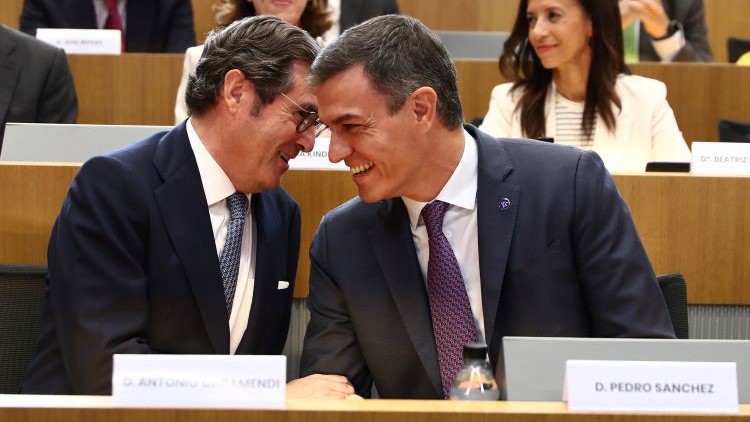Eduardo González
The acting President of the Government, Pedro Sánchez, yesterday warned of the need to “reindustrialize Europe” by strengthening its “strategic autonomy” in goods, services and raw materials in which the EU is already competitive “globally” and which are “absolutely essential” to guarantee security, such as artificial intelligence (AI), wind turbines, transmission grids, organic fertilizers or active pharmaceutical ingredients, among others.
“Strategic autonomy is a capital issue, an issue that some only remember when part of a national company is bought by a foreign company or when we suffer the occasional shortage of a certain product,” said Sánchez during the presentation of ResilientEU2030, the strategic proposal of the Spanish Presidency of the EU to strengthen the resilience and global competitiveness of the European Union in the energy, digital technologies, health and food sectors.
The event took place within the framework of the ResilientEU2030 Forum, held at the headquarters of the Spanish Confederation of Business Organizations (CEOE) in Madrid and attended by the Third Vice President and acting Minister for Ecological Transition and the Demographic Challenge, Teresa Ribera; the acting Minister of Foreign Affairs, José Manuel Albares; the acting Minister of Industry, Trade and Tourism, Héctor Gómez; the acting Minister of Agriculture, Fisheries and Food, Luis Planas, and the acting Minister of Territorial Policy and Government Spokesperson, Isabel Rodríguez.
Strategic autonomy, he continued, “fully affects” the “competitiveness of the Spanish economy, of our companies and, consequently, of the welfare of our citizens”. “We saw it during the pandemic in a dramatic way. We can never forget it when the lack of sanitary material dramatically impacted our citizens. We saw it during the commercial disruption that followed, with long waiting times for access to everyday goods like a car, a bicycle or even a household appliance. And we are still seeing it today, with food prices, energy prices as a result of Putin’s war in Ukraine and the decisions being taken by some oil-producing countries, for example,” he said.
All this is happening, he warned, at a time when “the international order, based on the principles of openness and multilateralism that we built throughout the second half of the 20th century, with the Bretton Woods institutions, and which we believed would be maintained indefinitely, is showing signs of weakening”, and in which “protectionism, trade barriers, economic conflicts are multiplying and are increasingly present in our daily lives”.
In this scenario, he said, “Europe, its institutions, must move much faster and more quickly in the face of these challenges”, in order to “reduce our external dependencies and consequently strengthen our strategic productive capacities”, while at the same time defending an “open” global economy in which “Europe retains its leading position”.
Reindustrializing Europe
For all these reasons, in the opinion of the acting president, a key factor is “to reindustrialize Europe and, therefore, to strengthen our productive capacities”, because “the days of massive relocations, of indiscriminate opening, of blind dependence on imports have to come to an end”. “Our continent needs more factories and more companies, it needs to protect and strengthen its leadership and autonomy in strategic sectors, such as energy, technology, health or agri-food,” warned Pedro Sánchez.
“That does not mean that the Union should start producing within its borders everything it currently brings from outside,” he continued. “On the contrary, we must be strategic and focus our efforts on those goods, services and raw materials in which we are already globally competitive, in which we could be at the forefront in a few years if we make a strategic commitment and in which they are absolutely essential to guarantee our security,” Pedro Sánchez explained. “I am referring to what we all have in mind, artificial intelligence, wind turbines, electrolyzers, transmission grids, organic fertilizers, solid batteries, active pharmaceutical ingredients, to name a few,” he added.
Besides, he warned, “we have to strengthen our internal capacities” and, therefore, “it is essential that we strengthen our strategic capacities” and, at the same time, “avoid simplistic temptations that emanate from protectionism and nativist speeches that say that by closing our borders we will live better”. “The Union must not expel foreign companies; on the contrary, what we have to do is to attract them. We have to create opportunities for them, because they also create opportunities in our continent, because they create jobs, because they generate wealth and because their presence here is part of the commercial reciprocity that is the backbone of what is called the open international order, in which we Europeans grow and prosper,” he added.
Resilient EU2030
In March 2022, leaders of the 27 EU member states signed up to the need to address vulnerabilities in global supply chains highlighted by the COVID-19 pandemic, the Russian invasion of Ukraine and rising geopolitical tensions. Since then, the European Commission has launched several initiatives aimed at enhancing the EU’s open strategic autonomy in areas such as semiconductors, critical raw materials and green transition technologies.
The Spanish proposal Resilient EU2030 projects a roadmap for the next seven years, which examines the main vulnerabilities that the EU could face in this decade and identifies a series of cutting-edge goods, services and technologies in which Europe should develop its productive capabilities. It also reflects on the role of industrial policy and the need to boost innovation, human capital upgrading and Single Market integration. It also analyzes how the ecological transition can become a catalyst for European resilience and advocates a new expansion of global trade and the modernization of the multilateral system as essential ways to ensure the future prosperity of Europe and the rest of the world.
The Spanish proposal is already being discussed in various European forums and will be examined by the Informal European Council to be held in Granada with the heads of state and presidents of government of the 27 Member States on October 6.





